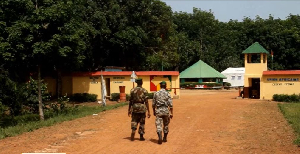Educational story from Raymond Danso
From Raymond Danso, Accra
Touching the Lives of Girls Foundation (TLGF), a non-governmental organization, has organized a day’s workshop on menstrual hygiene for 650 pupils from selected schools within the Accra Metropolis.
In his opening address, Mr. Anthony Kwaku Amoah, a public relations officer of the Ghana Education Service (GES) and the guest speaker at the function, lauded the organization for their initiative and urged them to continue to work with the GES in providing quality education to every citizen in the country.
According to Mr. Amoah, there is no way the Government or the GES could do it all alone, hence, “The need for as many organisations as possible to link up with government and the GES to produce the best of professionals and leaders that we are looking for as a nation.”
“No one agency, be it GES or whichever, can effectively tackle the rising cases of teenage pregnancy, lesbianism, blood covenant, child marriage and abuse of drugs and social media involving a lot of children in our schools and society”, he said.
Speaking at the function, Dr. Emmanuel Fiawoo, who was the resource person, advised girls and young females to be conscious of their sexuality for good health and improved performance in school.
“You have to take good care of your body, especially during menstruation; bath well, wash your private parts well and change your pad regularly, at least twice a day. Report any abnormal condition that you experience through during menstruation to your teacher, parent or doctor for help”, he stated.
Nana Ama Adutwumwaah, the president of TLGF, assured that her organization will continue to mobilize requisite resources and expertise to support girl-child education in the country, and added, “All we need is the co-operation of parents, teachers and our education authorities”.
Ms. Rebecca Acheampong, popularly known as Becca in the creative industry, in a speech as the guest of honour and focal person on child health education to the organization, said there was the need for the school and society to intensify its support services to children, including health, for them to live confortable lives and to perform well in education.
Health News of Monday, 20 February 2017
Source: Raymond Danso













